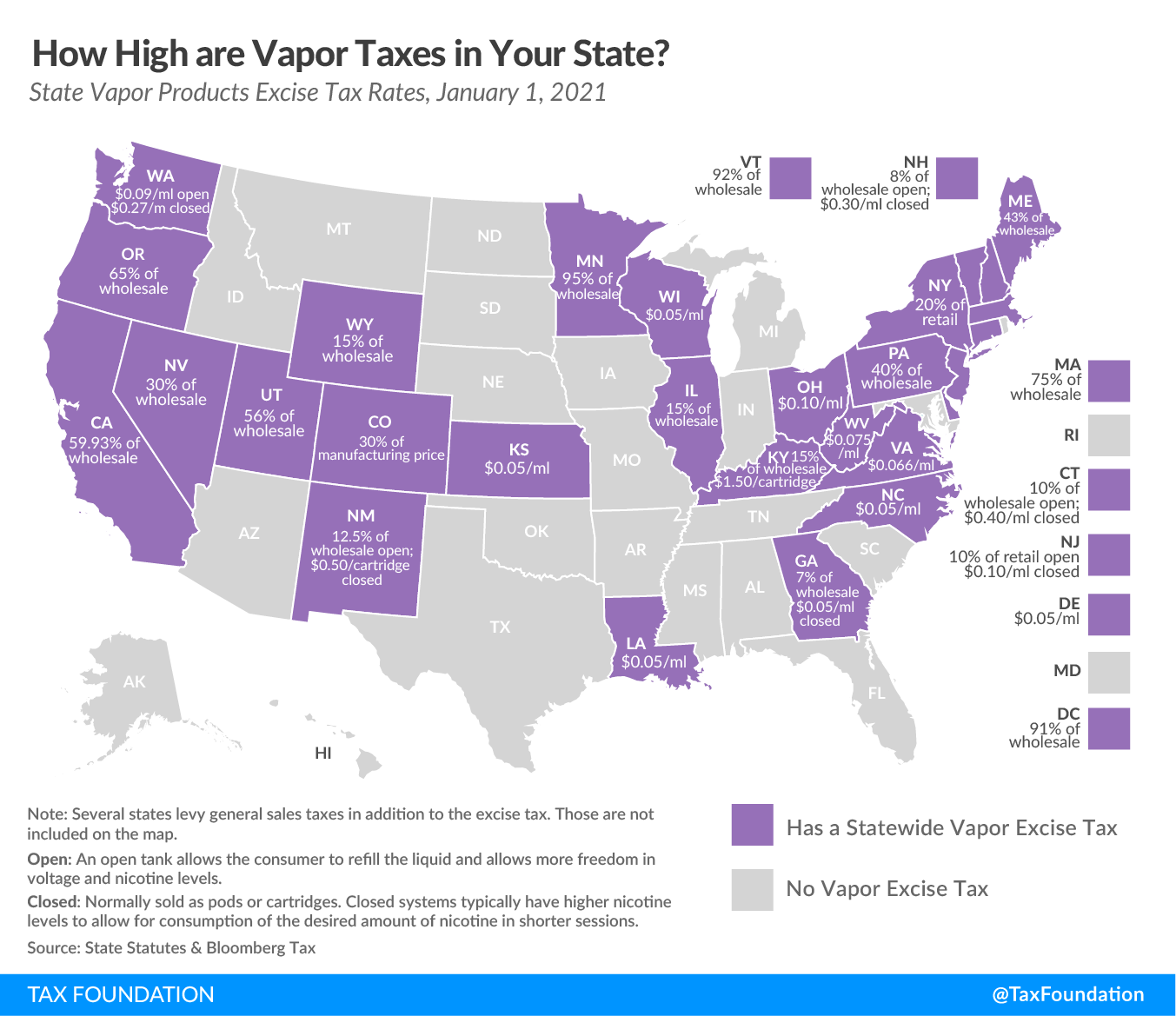
The figure above can reflect the electronic cigarette tax situation of various states in the United States, of which the gray area is the area where the electronic cigarette tax is not levied.
The taxation policies for electronic cigarettes are different from state to state in the United States, with Minnesota topping the list with an ultra-high wholesale tax of 95%. Arizona, Florida, and other 20 states do not tax electronic cigarettes.

Data source from https://taxfoundation.org/
The US market plays a leading role in the development of global e-cigarettes.
According to 《The data of the 2022 Electronic Cigarette Industry Export Blue Book》, the US electronic cigarette market is very large, and its market share is expected to exceed 65% of the total overseas electronic cigarette market in 2022.
However, the taxes and fees of the United States vary from state to state and from place to place, due to the different definitions and understandings of electronic cigarettes by various legislatures.
For example, in Wisconsin, an "electronic cigarette product" is defined as "a noncombustible product that uses heating elements to produce vapor or aerosol for inhalation of tobacco oil or other substances. The tobacco oil is exhausted during heating, regardless of whether nicotine is contained in the tobacco oil or other substances".
In California, electronic cigarettes are defined as "any device or delivery system packaged with nicotine substances, which can be used to deliver nicotine to the human body in the form of aerosol or vaporization, including but not limited to electronic cigarettes, electronic cigars, electronic pipe, electronic cigarette guns or electronic hookah".
As of July 1, 2022, there are 30 states in the United States (plus Washington, D.C.) imposing consumption tax on electronic cigarette products. The taxation methods adopted by different states are different. Some states adopt the principle of ad valorem taxation, some states levy taxes on certain quantities of tobacco oil/smoke bombs, and some states levy different taxes on open and closed electronic cigarette products.
Among all the states that levy wholesale tax, Minnesota tops the list with 95% wholesale tax, and Vermont follows with 92% wholesale tax. Delaware, Kansas, Louisiana, North Carolina, Wisconsin, and other states all levy consumption tax on tobacco oil at the lowest tax rate, which is 5 cents per milliliter.
Some states have different tax and regulatory policies.
On July 1, 2022, California will levy a 12.5% retail tax based on the original 61.74% wholesale tax. The Los Angeles Times said that the new tax is expected to create $38.4 million for the government before 2023. With such high taxes and the approval of the ban on flavoring electronic cigarettes, the situation of California's electronic cigarette market is like adding insult to injury. Similarly, Massachusetts, the first state in the United States to ban flavored cigarettes and electronic cigarettes, has a wholesale tax rate of up to 75%.
On the other hand, New Jersey, New York, and Rhode Island, which have introduced the ban on flavoring electronic cigarettes, have relatively low or even zero consumption tax rates on electronic cigarettes.
Lower taxes can encourage consumption transformation, while higher taxes can make people abandon electronic cigarettes and return to the ranks of smokers, affecting public health. A survey in 2019 found that the super high wholesale tax of 95% in Minnesota forced more than 30000 smokers to stay away from electronic cigarettes and could not quit smoking.
Global electronic cigarette regulation is becoming stricter. As one of the means to control electronic cigarettes, taxation may be chosen by more and more governments.
Notice:
【1】 This article is only used for communication and discussion within the industry and does not make any brand and product promotion or recommendation.
【2】 Smoking is harmful to health. Minors are prohibited from reading this article.



